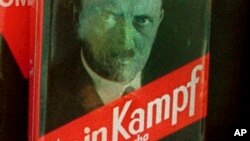Adolf Hitler's manifesto Mein Kampf is expected to be published in Germany next year for the first time since the death of the World War II dictator held responsible for the Holocaust.
With the expiration of a 70-year copyright hinged on the 1945 suicide death of the anti-Semitic ruler, the manuscript enters the public domain, and plans to publish an annotated version of the two-volume work in German have sparked public controversy.
Jewish groups say the work, which outlines the development of Hitler's anti-Semitism, is dangerous and should never be published in Germany again. But the publishers of Hitler, Mein Kampf. A Critical Edition say their version surrounds the hate speech of Adolf Hitler with context, explaining how the most famous villain of the 20th century formed his ideas and pointing out the flaws and untruths in his arguments.
Mein Kampf has not been published in German since 1945, out of respect for the millions of Jews, Roma, and others who died in Nazi concentration camps during the war. It has been available in other languages, published in other countries.
Adolf Hitler wrote the book in two volumes. He began the first volume, published in 1925, while in prison after a failed putsch in Munich. The second volume came out a year later. The work rose in popularity as Hitler gained power, reaching sales of some 12 million copies in 18 languages by his death in 1945.
Meanwhile, the copyright to another seminal book of the World War II era, The Diary of Anne Frank, is also set to run out by the end of the year, inspiring an effort by the Swiss foundation holding the copyright to extend it to keep the book from entering the public domain.
The Anne Frank Fonds last month announced its intention to add Anne's father Otto Frank as a co-author, which would extend the copyright to 2050. Otto Frank is responsible for getting the diary published after his teenaged daughter died in a concentration camp in 1945. The organization argues that his involvement with the editing of the diary was extensive enough to consider him a co-author. Extending the copyright to 2050 would ensure that the foundation keeps receiving profits from the rights to the diary for the next 35 years.
The foundation donates proceeds from book sales to various charitable causes, funding education and other types of support for needy children and teenagers worldwide.
But the plans are contested by those who believe Frank's writings should enter the public domain as originally expected. A French lawmaker and a lecturer at the University of Nantes have both announced they will go ahead and publish the text, in the original Dutch, online in January. The Amsterdam-based Anne Frank House has also objected the copyright extension, as it had been planning to release an online edition when the copyright expired.
The Diary of Anne Frank, which details the young Jewish author's two years in hiding with her family in Amsterdam, is one of the most widely read books of the 20th century, selling some 30 million copies to date.






